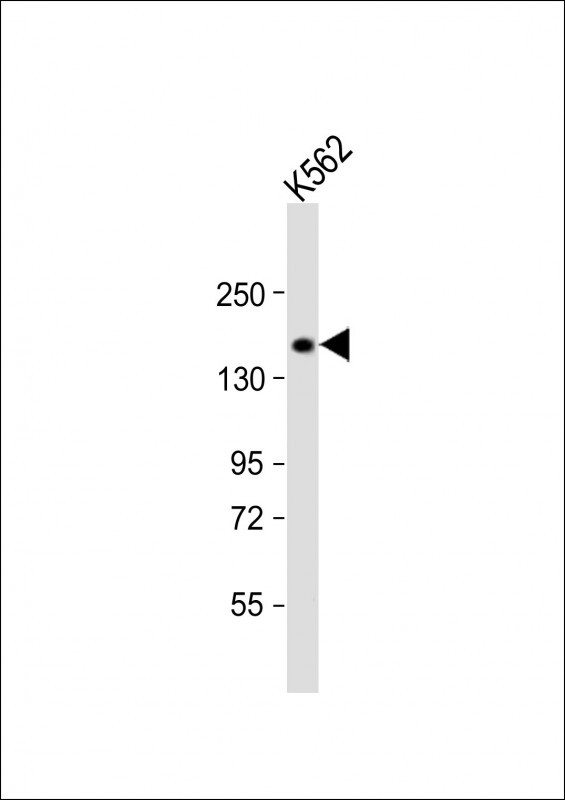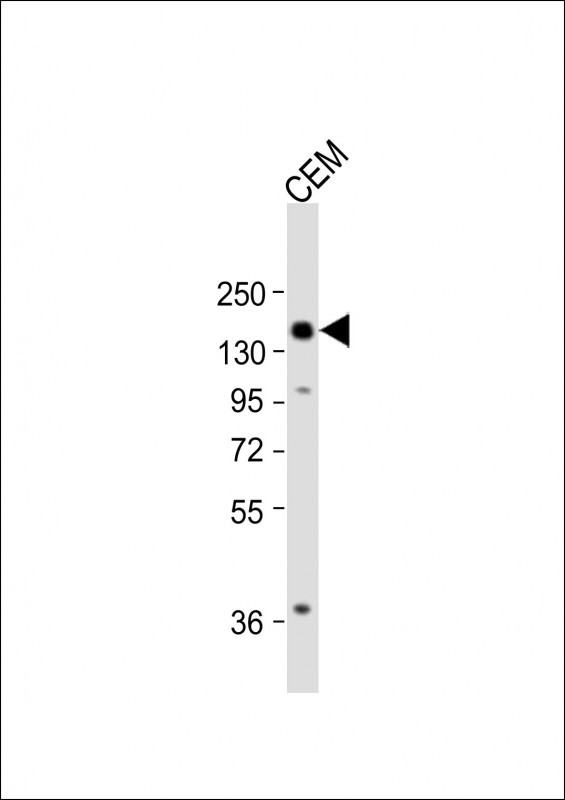

| WB | 1/2000 | Human,Mouse,Rat |
| IF | 咨询技术 | Human,Mouse,Rat |
| IHC | 咨询技术 | Human,Mouse,Rat |
| ICC | 技术咨询 | Human,Mouse,Rat |
| FCM | 咨询技术 | Human,Mouse,Rat |
| Elisa | 咨询技术 | Human,Mouse,Rat |
| Aliases | Autophagy-related protein 2 homolog B, ATG2B, C14orf103 |
| Entrez GeneID | 55102 |
| WB Predicted band size | 23.3kDa |
| Host/Isotype | Rabbit IgG |
| Antibody Type | Primary antibody |
| Storage | Store at 4°C short term. Aliquot and store at -20°C long term. Avoid freeze/thaw cycles. |
| Species Reactivity | Human, Mouse |
| Immunogen | This ATG2B antibody is generated from rabbits immunized with a KLH conjugated synthetic peptide between 118-146 amino acids from the N-terminal region of human ATG2B. |
| Formulation | Purified antibody in PBS with 0.05% sodium azide. |
+ +
以下是关于 ATG2B (N-term) 抗体的 3 篇参考文献,涵盖其功能研究和应用场景:
---
1. **文献名称**: *"Mammalian Atg2 proteins are essential for autophagosome formation and important for regulation of size and distribution of lipid droplets"*
**作者**: Velikkakath, A.K.G. et al.
**摘要**: 本研究利用针对 ATG2B N 端的抗体,通过免疫印迹和免疫荧光证实 ATG2B 在自噬体形成中的关键作用,并揭示其通过脂质转移调控自噬膜延伸的分子机制。
2. **文献名称**: *"Reconstitution of Rabin8-TRAPPII membrane tethering in autophagosome biogenesis"*
**作者**: Koyama-Honda, I. et al.
**摘要**: 文章使用 ATG2B (N-term) 抗体进行体外重组实验,证明 ATG2B 与 ATG9A 的互作对自噬前膜扩张的必要性,并揭示了其在膜重塑中的动态行为。
3. **文献名称**: *"Structural insights into the interaction of human ATG2B-WIPI1 complex with membranes"*
**作者**: Tamura, N. et al.
**摘要**: 通过 ATG2B N 端特异性抗体结合冷冻电镜技术,解析了 ATG2B-WIPI1 复合物与膜结合的分子结构,阐明了其介导脂质转移的分子基础。
---
**说明**:以上文献均涉及 ATG2B 的 N 端抗体在功能验证(如免疫印迹、互作分析)或结构研究中的应用,可作为自噬相关蛋白检测及机制研究的参考。如需具体 DOI 或年份信息,可进一步补充筛选。
The ATG2B (N-term) antibody is a research tool designed to detect the N-terminal region of autophagy-related protein 2B (ATG2B), a key player in autophagy—a cellular recycling process critical for maintaining homeostasis. ATG2B, along with its homolog ATG2A, facilitates lipid transfer during autophagosome formation, particularly in expanding the phagophore membrane. This antibody specifically targets epitopes near the N-terminus of human ATG2B, which is encoded by the ATG2B gene located on chromosome 14q32.
ATG2B is ubiquitously expressed and interacts with other autophagy regulators like WIPI proteins and ATG9A. Dysregulation of ATG2B has been implicated in cancers, neurodegenerative disorders, and metabolic diseases, making it a focus of autophagy-related pathology studies. The ATG2B (N-term) antibody is commonly used in techniques such as Western blotting, immunofluorescence, and immunoprecipitation to assess protein expression, localization, or interactions.
Validation often includes testing in cell lines or tissues with confirmed ATG2B expression, alongside siRNA knockdown controls to confirm specificity. Researchers utilize this antibody to explore ATG2B’s role in autophagy mechanisms, disease models, or therapeutic responses. When interpreting results, considerations like post-translational modifications, isoform diversity, or potential cross-reactivity with ATG2A (due to sequence homology) should be noted. Proper controls are essential to ensure accurate data interpretation.
×